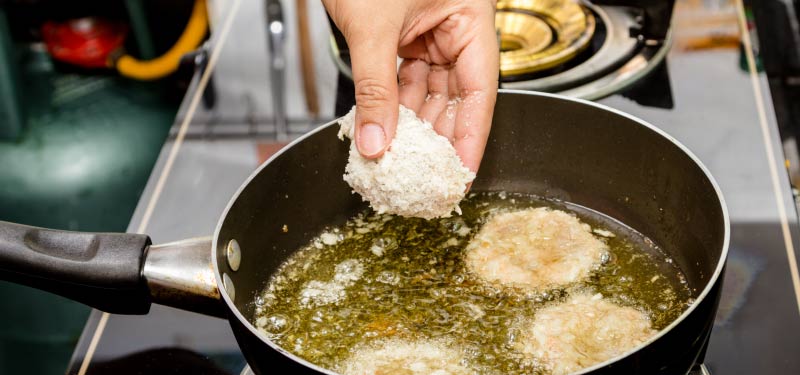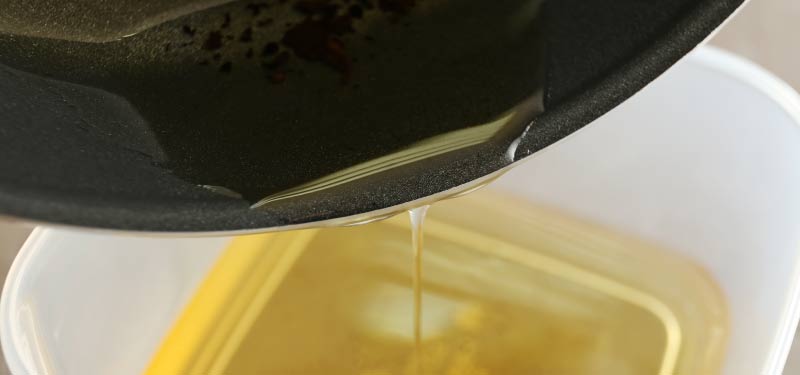What does it mean when an oil is rancid?
An oil becomes rancid when its unsaturated fatty acids are oxidized or decomposed under the influence of light, air, and heat.
As a result, a series of chemical reactions occur that can generate compounds with unpleasant odors and altered tastes.
Rancid oil:
- may have a pungent, unpleasant odor
- a bitter or acrid taste
- may contain substances harmful to health such as aldehydes and peroxides which are formed during the decomposition of the oil
These scenarios never arise in an oil mill like Frantoio D'Orazio, which follows essential rules and regulations.
How to avoid spoiled oil
When purchasing, consumers must be extremely careful. Here are some tips to avoid purchasing poor-quality oil:
- Always look for extra virgin olive oil sold in UV-protected glass bottles (like Brightland), which shield the olive oil from the enemy of freshness: light. For example, at Frantoio D'Orazio, we store our quality extra virgin olive oil in dark glass bottles or designer tins that block out light.
- Read the label carefully: you'll find the words "extra virgin," the place of origin, and who produces it.
- Light, pure and refined refers to processing that removes flavor and nutrients.
Does extra virgin olive oil have an expiration date?
The expiry date is usually considered to be within 18 months from the bottling date , and establishes the period of time in which the olive oil maintains its flavours, aromas and nutritional characteristics intact.
Although it is perfectly safe to consume olive oil after the expiration date, from that point on the manufacturer does not guarantee that the product will retain all of its organoleptic properties as they were when bottled.
How to recycle oil

Is it possible to reuse extra virgin olive oil for frying several times ?
While every chef or cooking enthusiast will have their own theory about the properties of oil, if we are careful to use it properly for frying, we can reuse it with complete guarantees.
If used consistently at a temperature of 180°, the oil can be reused if first filtered and frying residues removed a maximum of twice.
How to reuse expired oil
Oil that has expired a long time ago or that hasn't been stored properly will no longer be suitable for cooking, but it can be reused in a few ways:
- Furniture polish : An excellent natural choice for polishing all types of wooden furniture and enhancing its shine, especially if made of olive wood. It can also be used to polish wooden cutting boards; simply mix old olive oil with lemon juice and work it into the surface using a microfiber cloth.
- Eliminate squeaking doors : By greasing the hinges, that creaking sound should disappear in no time! Just be sure not to use too much; a few drops per hinge will be more than enough.
- Give leather jackets, bags, or belts a new lease of life : oil is an excellent conditioner for these materials and will help them last longer. How? Oil a clean microfiber cloth and gently rub it over the leather.
- for garden activities
- like shoe polish
- as a lubricant and fuel for lamps
- Not everyone knows this but it can also be a great ally for removing traces of paint and for removing chewing gum or sticker residues
How to dispose of old olive oil

Olive oil, like other cooking oils, should never be poured down the drain or thrown in the garbage.
The easiest way to dispose of used olive oil is to place it in an airtight, shatterproof container before disposal or to take it to a waste recycling center.
How to clean an olive oil bottle for recycling
Before attempting to recycle a cooking oil bottle , make sure every drop of oil has been safely removed from the container.
Here are some tips:
- To collect any large amounts of residual oil, turn the bottle upside down on a paper towel
- To fill the container you can use a solution made of bicarbonate, dish soap and vinegar
- Place the lid on the container and shake it to evenly distribute the ingredients and absorb any excess oil (mixing with water is not a good idea)
- throw used paper towels and other absorbent items in the non-recyclable garbage
- rinse the container in the sink once it is empty and free of oil
What does Frantoio D'Orazio do to delay oil oxidation?
Our Apulian mill applies some precautions to slow down the oxidation of the oil:
- In the tanks where we store oil to be packaged we blow nitrogen, an inert gas: being heavier, the oxygen escapes
- In the bottling line for tin bottles we repeat the blowing of nitrogen which, with the closure, remains in contact with the oil until the bottle is opened
The purpose of using nitrogen is precisely to remove oxygen, one of the main factors contributing to oil oxidation.
Here are some dos and don'ts for caring for extra virgin olive oil.
We recommend that you:
- Store olive oil in a cool, dark place, such as a cabinet or pantry;
- use small decanters or containers for tabletop use rather than a large container or bottle: especially when the oil is purchased in large quantities (more than 5 litres), we recommend transferring it immediately into smaller bottles ready for use;
- Make sure to keep the cap tightly closed when not in use.
To avoid instead:
- Store olive oil near or on the stove or other heat sources: the heat will affect even a dark bottle or can. We also advise against storing it in other places, such as the top of the refrigerator, which is often hot due to the components that keep the interior cool.
- Leave a spout on the bottle if the opening cannot be sealed: this will allow continued exposure to air and promote oxidation that leads to rancidity.
Discover all the quality extra virgin olive oil products in the vast selection in our shop.
